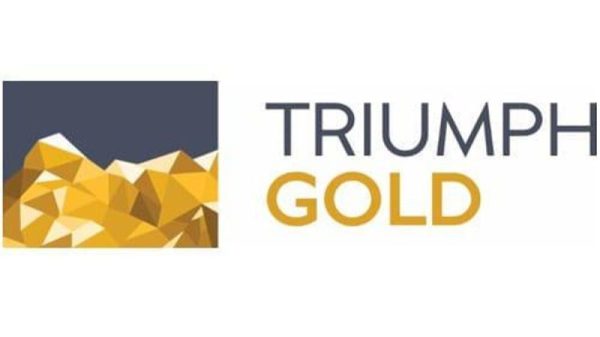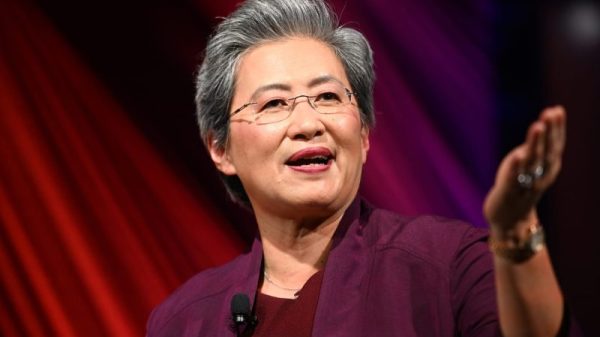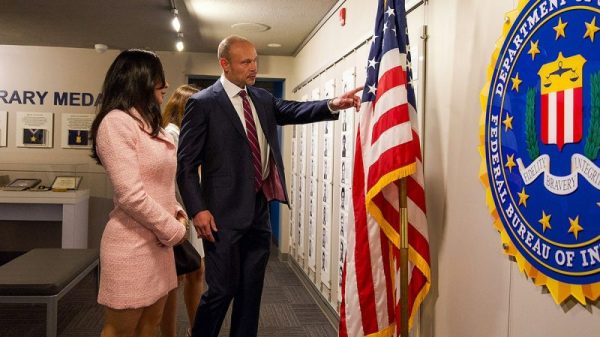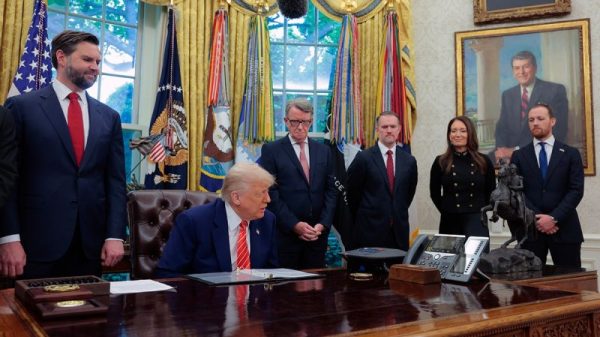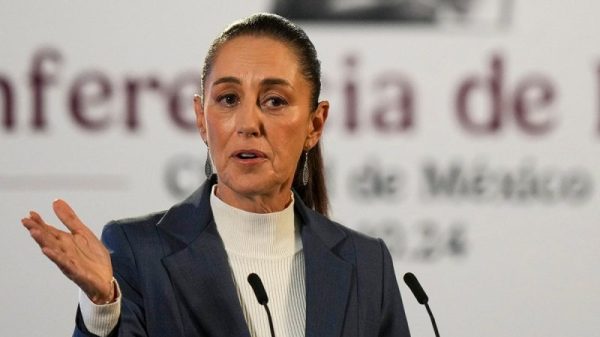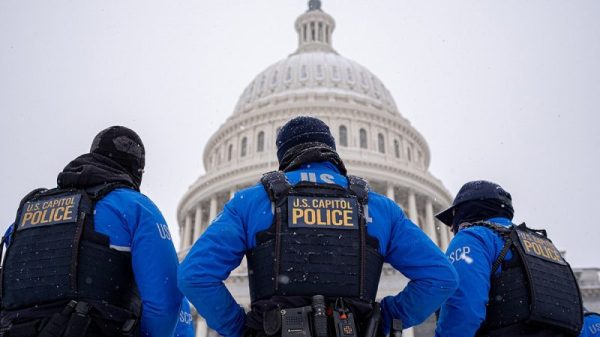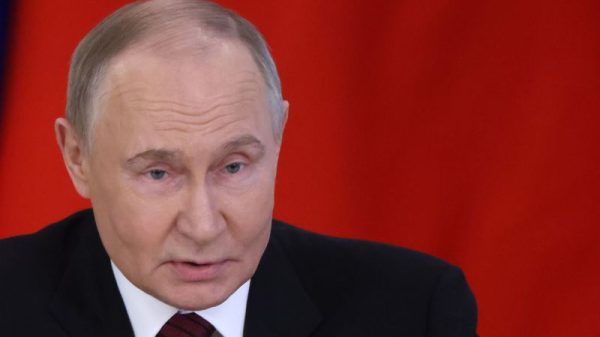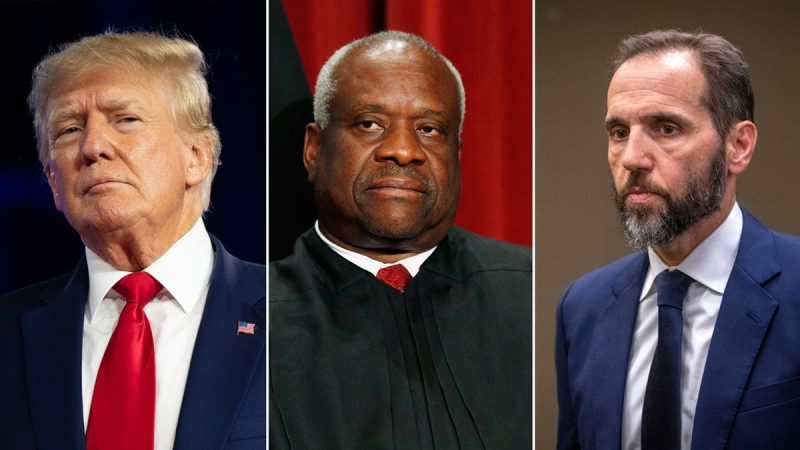Supreme Court Justice Clarence Thomas raised a question Thursday that goes to the heart of Special Counsel Jack Smith’s charges against former President Donald Trump.
The high court was considering Trump’s argument that he is immune from prosecution for actions he took while president, but another issue is whether Smith and the Office of Special Counsel have the authority to bring charges at all.
‘Did you, in this litigation, challenge the appointment of special counsel?’ Thomas asked Trump attorney John Sauer on Thursday during a nearly three-hour session at the Supreme Court.
Sauer replied that Trump’s attorneys had not raised that concern ‘directly’ in the current Supreme Court case — in which justices are considering Trump’s arguments that presidential immunity precludes the prosecution of charges that the former president illegally sought to overturn the 2020 election.
Sauer told Thomas that, ‘we totally agree with the analysis provided by Attorney General Meese [III] and Attorney General Mukasey.’
‘It points to a very important issue here because one of [the special counsel’s] arguments is, of course, that we should have this presumption of regularity. That runs into the reality that we have here an extraordinary prosecutorial power being exercised by someone who was never nominated by the president or confirmed by the Senate at any time. So we agree with that position. We hadn’t raised it yet in this case when this case went up on appeal,’ Sauer said.
In a 42-page amicus brief presented to the high court in March, Meese and Mukasey questioned whether ‘Jack Smith has lawful authority to undertake the ‘criminal prosecution” of Trump. Mukasey and Meese — both former U.S. attorneys general — said Smith and the Office of Special Counsel itself have no authority to prosecute, in part because he was never confirmed by the Senate to any position.
Federal prosecutions, ‘can be taken only by persons properly appointed as federal officers to properly created federal offices,’ Meese and Mukasey argued. ‘But neither Smith nor the position of special counsel under which he purportedly acts meets those criteria. He wields tremendous power, effectively answerable to no one, by design. And that is a serious problem for the rule of law — whatever one may think of former President Trump or the conduct on January 6, 2021, that Smith challenges in the underlying case.’
The crux of the problem, according to Meese, is that Smith was never confirmed by the Senate as a U.S. attorney, and no other statute allows the U.S. attorney general to name merely anyone as special counsel. Smith was acting U.S. attorney for a federal district in Tennessee in 2017, but he was never nominated to the position. He resigned from the private sector after then-President Trump nominated a different prosecutor as U.S. attorney for the middle district of Tennessee.
Meese and Mukasey argued that because the special counsel exercises broad authority to convene grand juries and make prosecutorial decisions, independent of the White House or the attorney general, he is far more powerful than any government officer who has not been confirmed by the Senate.
Sauer and Trump’s other attorneys objected to the legitimacy of Smith’s appointment in the charges against Trump in the classified documents case, also brought by Smith, before a Florida federal court.
In a March court filing in Florida, Trump’s attorneys claimed that the special counsel’s office argues in federal court that Smith is wholly independent of the White House and Garland — contradicting Trump’s arguments that the federal charges against him are politically motivated. But at the same time, the special counsel’s attorneys insist that Smith is subordinate to the attorney general, and therefore not subject to Senate confirmation under the Appointments Clause of the U.S. Constitution.
‘There is significant tension between the Office’s assurances to that court that Smith is independent, and not prosecuting the Republican nominee for President at the direction of the Biden Administration, and the Office’s assurance here that Smith is not independent and is instead so thoroughly supervised and accountable to President Biden and Attorney General Garland that this Court should not be concerned about such tremendous power being exercised to alter the trajectory of the ongoing presidential election,’ Trump’s attorneys wrote in the filing.
The special counsel’s office, responding to Trump’s claims in the Florida case, argued that the attorney general ‘has the statutory authority to appoint a Special Prosecutor’ and that the Supreme Court even upheld that authority ‘in closely analogous circumstances nearly 50 years ago’ — in a 1974 case that challenged the prosecutor investigating the late President Richard Nixon.
Meese and Mukasey wrote in their brief that the Nixon case was irrelevant because it ‘concerned the relationship between the President and DOJ as an institution, not between the President and any specific actor purportedly appointed by DOJ.’
The pair also said special counsel investigations are necessary and often lawful, but stated that ‘the Attorney General cannot appoint someone never confirmed by the Senate, as a substitute United States Attorney under the title ‘Special Counsel.’ Smith’s appointment was thus unlawful, as are all actions flowing from it, including his prosecution of former President Trump.’
Smith was a private citizen when Attorney General Merrick Garland appointed him as special counsel to investigate Trump in 2022.
Other recent special counsels — including John Durham’s Trump-Russia probe; David Weiss of the Hunter Biden investigation; and Robert Hur, who investigated Biden’s mishandling of classified documents — were all confirmed by the Senate to various positions before being named as special counsels.
The Florida court has yet to rule on Trump’s motion to dismiss the classified documents case due to claims that Smith was improperly appointed.
The Supreme Court is expected to rule on Trump’s immunity arguments before its term ends in June.





